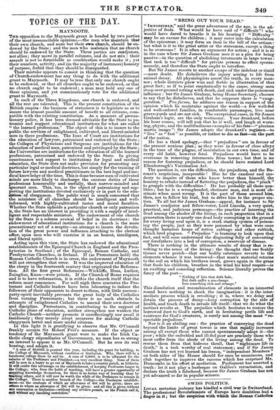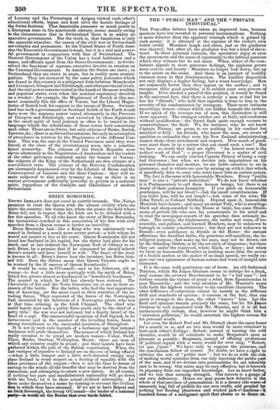SWISS POLITICS.
LOCAL sectarianjealousy has kindled a civil war in Sivitzerland. The professional Revolutionists of Europe have doubtless had s finger in it ; but the inispioion with -Which the Roman Catholics of Lucerne and the Protestants of Aargau viewed each other's educational efforts,and kept alive the hostile feelings of the Swiss factions. bTrallfanaticism possesses so much power in a European state in the nineteenth century, seems mainly owing to the circumstance that in Switzerland there is in reality no executive government. But the truth is, that fanaticism is only the apparent stimulus : the causes of the civil war in Switzerland are complex and permanent. In the United States of North Ame- rica the Executive Government is weak, but it is a real and power- fal government in comparison with that of Switzerland. The General Government of the Union has a local habitation and a name, and officials apart from the States Governments : in Switz- erland the functions of supreme executive devolve in rotation on the Cantonal Governments. In America the States are states; in Switzerland they are states in name, but in reality mere munici- palities. They are animated by the same paltry jealousies which are found in this country in a mitigated form between Manchester and Liverpool, Glasgow and Edinburgh, and other provincial rivals. And the real power remainsvested in the hands of themore wealthy and populous states, even when the nominal supremacy devolves on a weaker : for example, the Magistracy of Zurich at this mo- ment nominally fills the Office of Vorort, but the Liberal Magis- trates of Zurich look for support to the troops of Berne. Switzer- land has such a government as Scotland South of the Forth would have were the supreme power vested alternately in the Provosts of Glasgow and Edinburgh, and exercised by those dignitaries in the small spirit of local jealousy so often to be traced in the age which the inhabitants of those towns hold concerning other. There are no Swiss, but only citizens of Berne, Zurich, Lucerne, &c.; there is no Swiss Government, but only an assumption of piecedence in rotation by the Magistrates of the different Can- tons. This was the case in the United Provinces until they were forced, at the close of the revolutionary wars, into a constitu- tional monarchy. The citizens of the Dutch Republic were slaves alternately to the Magistrates of Amsterdam and the leaders of the other provinces combined under the banner of Nassau : the subjects of the King of the Netherlands are free citizens of a consolidated state. The citizens of the Helvetic Confederation are alternately domineered over by the Liberals of Berne and the Conservatives of Lucerne and the three Cantons : they will re- main subjected to this petty tyranny so long as there is no
central government sufficiently powerful to govern in a national . . , regardless of the Guelphs and Ghibellines of modern 'tzerland.



























 Previous page
Previous page